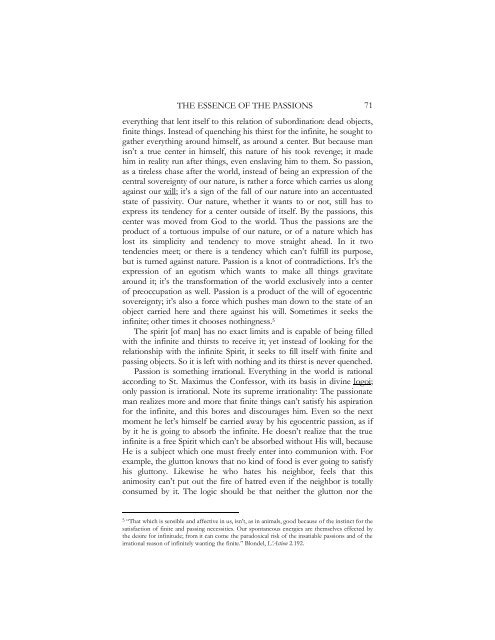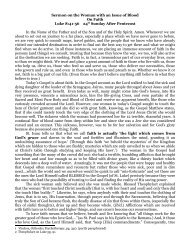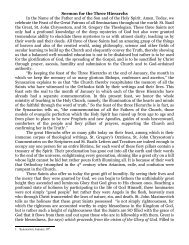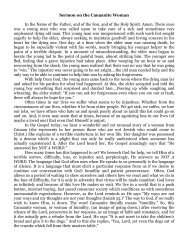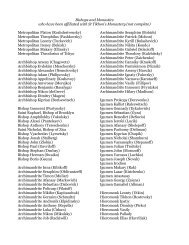to read Chapter One of Orthodox Spirituality. - The Monastery of St ...
to read Chapter One of Orthodox Spirituality. - The Monastery of St ...
to read Chapter One of Orthodox Spirituality. - The Monastery of St ...
You also want an ePaper? Increase the reach of your titles
YUMPU automatically turns print PDFs into web optimized ePapers that Google loves.
THE ESSENCE OF THE PASSIONS 71everything that lent itself <strong>to</strong> this relation <strong>of</strong> subordination: dead objects,finite things. Instead <strong>of</strong> quenching his thirst for the infinite, he sought <strong>to</strong>gather everything around himself, as around a center. But because manisn’t a true center in himself, this nature <strong>of</strong> his <strong>to</strong>ok revenge; it madehim in reality run after things, even enslaving him <strong>to</strong> them. So passion,as a tireless chase after the world, instead <strong>of</strong> being an expression <strong>of</strong> thecentral sovereignty <strong>of</strong> our nature, is rather a force which carries us alongagainst our will; it’s a sign <strong>of</strong> the fall <strong>of</strong> our nature in<strong>to</strong> an accentuatedstate <strong>of</strong> passivity. Our nature, whether it wants <strong>to</strong> or not, still has <strong>to</strong>express its tendency for a center outside <strong>of</strong> itself. By the passions, thiscenter was moved from God <strong>to</strong> the world. Thus the passions are theproduct <strong>of</strong> a <strong>to</strong>rtuous impulse <strong>of</strong> our nature, or <strong>of</strong> a nature which haslost its simplicity and tendency <strong>to</strong> move straight ahead. In it twotendencies meet; or there is a tendency which can’t fulfill its purpose,but is turned against nature. Passion is a knot <strong>of</strong> contradictions. It’s theexpression <strong>of</strong> an egotism which wants <strong>to</strong> make all things gravitatearound it; it’s the transformation <strong>of</strong> the world exclusively in<strong>to</strong> a center<strong>of</strong> preoccupation as well. Passion is a product <strong>of</strong> the will <strong>of</strong> egocentricsovereignty; it’s also a force which pushes man down <strong>to</strong> the state <strong>of</strong> anobject carried here and there against his will. Sometimes it seeks theinfinite; other times it chooses nothingness. 5<strong>The</strong> spirit [<strong>of</strong> man] has no exact limits and is capable <strong>of</strong> being filledwith the infinite and thirsts <strong>to</strong> receive it; yet instead <strong>of</strong> looking for therelationship with the infinite Spirit, it seeks <strong>to</strong> fill itself with finite andpassing objects. So it is left with nothing and its thirst is never quenched.Passion is something irrational. Everything in the world is rationalaccording <strong>to</strong> <strong>St</strong>. Maximus the Confessor, with its basis in divine logoi;only passion is irrational. Note its supreme irrationality: <strong>The</strong> passionateman realizes more and more that finite things can’t satisfy his aspirationfor the infinite, and this bores and discourages him. Even so the nextmoment he let’s himself be carried away by his egocentric passion, as ifby it he is going <strong>to</strong> absorb the infinite. He doesn’t realize that the trueinfinite is a free Spirit which can’t be absorbed without His will, becauseHe is a subject which one must freely enter in<strong>to</strong> communion with. Forexample, the glut<strong>to</strong>n knows that no kind <strong>of</strong> food is ever going <strong>to</strong> satisfyhis glut<strong>to</strong>ny. Likewise he who hates his neighbor, feels that thisanimosity can’t put out the fire <strong>of</strong> hatred even if the neighbor is <strong>to</strong>tallyconsumed by it. <strong>The</strong> logic should be that neither the glut<strong>to</strong>n nor the5 “That which is sensible and affective in us, isn’t, as in animals, good because <strong>of</strong> the instinct for thesatisfaction <strong>of</strong> finite and passing necessities. Our spontaneous energies are themselves effected bythe desire for infinitude; from it can come the paradoxical risk <strong>of</strong> the insatiable passions and <strong>of</strong> theirrational reason <strong>of</strong> infinitely wanting the finite.” Blondel, L’Action 2.192.


